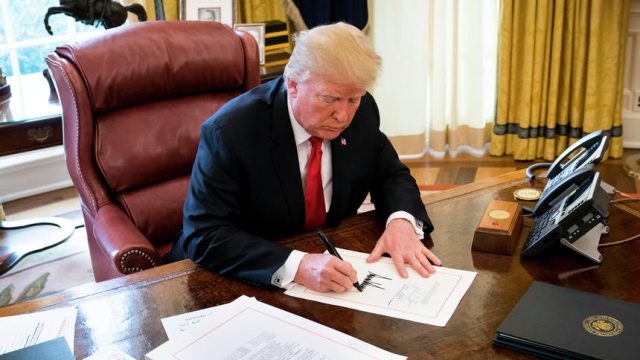North Dakotans Could Enjoy an Additional $33.8 Million in Savings Thanks to the Trump Tax Cuts

President Donald Trump signs a sweeping tax bill in the Oval Office of the White House, in Washington, Dec. 22, 2017. Trump signed the bill on Friday that Republicans promise will benefit the middle class, despite warnings from Democrats that the new law could be harmful to the country. (Doug Mills/The New York Times)
I had to laugh a bit when I saw this headline over my colleague John Hageman’s piece about the impact of federal tax reform on state-level revenues.
“ND tax office expects revenue hit from new tax law, but top legislators don’t plan on changes,” is the headline, and while it’s certainly true the Republican-backed tax reform will impact state income tax collections, from another perspective that “hit” turns into a bonus for North Dakota taxpayers.
The reason federal tax law changes impact North Dakota is because our state, like 18 others, aligns parts of our income tax code with the federal government. When the feds make changes to things like deductions they can apply to our state income taxes as well.
[mks_pullquote align=”left” width=”300″ size=”24″ bg_color=”#ffffff” txt_color=”#000000″]…it’s a 3.6 percent reduction in the taxes North Dakotans will pay, or $33.8 million in additional tax bill savings, through June 30 of 2021.[/mks_pullquote]
Republicans cut taxes at the federal level, and that’s turning into a tax cut at the state level as well.
“In what Tax Commissioner Ryan Rauschenberger said was the most comprehensive breakdown of the new law’s effects, his office estimated the state would lose $4.9 million in the current two-year budget cycle, which ends in mid-2019, and nearly $28.9 million in the 2019-21 biennium,” Hageman reports. “That would represent about a 3.6 percent drop in income tax collections for a full two-year budget cycle.”
Alternatively, it’s a 3.6 percent reduction in the taxes North Dakotans will pay, or $33.8 million in additional tax bill savings, through June 30 of 2021.
Does it make the budgeting situation for lawmakers a little harder heading into the next session? Maybe. Rauschenberger concedes that this is a static analysis which doesn’t take into account the potential for increased economic activity resulting from the tax cuts.
But you can’t talk about the negative without also talking about the positive.
Hageman quotes Republican Rep. Craig Headland, chairman of the House Finance and Taxation Committee, as saying “that revenue reduction ends up in the pockets of our taxpayers.”
“I don’t know if I have any issues with that,” he added.
I’m not sure I do either.
In related news Kylie Oversen, titular chairwoman of the North Dakota Democratic Party and candidate for Tax Commissioner, made it clear that she doesn’t like the idea of North Dakotans getting additional tax relief but didn’t want to just come out and say that:
Kylie Oversen, the Democratic-NPL chairwoman and candidate for tax commissioner in this year’s election, said “We should be concerned about the impact on our budget,” but she was unsure of an “appropriate” legislative response.
“We’ve got to have a better and more comprehensive response to how we are handling the budget situation in this state,” she said.
If Oversen thinks she can win on the statewide ballot campaigning against tax relief I have a feeling November 6 is going to be a very, very long day for her.




